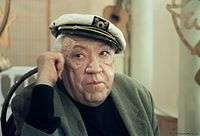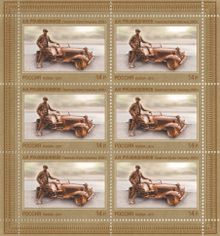Yuri Nikulin
Yuri Vladimirovich Nikulin (Russian: Юрий Владимирович Никулин; 18 December 1921 – 21 August 1997) was a well-known Soviet and Russian actor and clown who starred in many popular films.
Yuri Nikulin Юрий Никулин | |
|---|---|
 Yuri Nikulin | |
| Born | 18 December 1921 |
| Died | 21 August 1997 (aged 75)[1] |
| Resting place | Novodevichy Cemetery, Moscow |
| Occupation | Actor, clown, ringmaster |
| Title | Hero of Socialist Labour (1990) People's Artist of the USSR (1973) |
He was awarded the title of People's Artist of the USSR in 1973 and Hero of Socialist Labour in 1990. He also received a number of state awards, including the prestigious Order of Lenin, which he received twice in his lifetime.[2]
Early life and battle
Nikulin was born just after the end of the Russian civil war, in Smolensk in Western Russia. His mother was a garage supervisor and his father a writer of satirical plays – "a profession which may have influenced [Nikulin's] future career".[2]
Nikulin fought in the Red Army in the Winter War with Finland and the World War II with Germany. He reportedly had a comparably "long period of military service, from 1939-46, preparing to be demobilised just when the German invasion of the Soviet Union began in 1941."[2]
Biography
Nikulin's style and precise delivery, as well as his mastery of timing and his hilarious masks made him an outstanding comedian.[3]
In the ring, Nikulin presented a phlegmatic temperament, slow and unsmiling, and to many in the West his personality was reminiscent of the great silent film comedian Buster Keaton. Rich in mimicry, doleful of expression, Nikulin was hailed as “a brainy clown” outside Russia.
Nikulin, affectionately called "Uncle Yura" by Russian children, relied mainly upon his wits to earn his place in history as one of the best clowns of the 20th century.[4][5]
Career

Nikulin first took up clowning in 1944 when a political officer in his battalion, impressed by his repertoire of jokes, ordered him to organize entertainment for the division, which he did with resounding success. Encouraged, once the war ended, Nikulin reportedly "tried unsuccessfully to enter drama college before answering a newspaper advertisement recruiting trainees for the Clown Studio at Moscow's Tsvetnoy Boulevard Circus."[2]
Several acting schools and theatres rejected Nikulin allegedly due to "lacking artistic talent". However, he did find initial success at the Circus and qualified as a fully trained clown in 1950, and never abandoned his links with the circus. He met his wife, Tatyana, there, and in 1982 became the director of the Moscow Circus, a post he held until his death. His son, Maxim, is now a circus administrator.[2]
His screen debut came in 1958 with the film The Girl with the Guitar. He appeared in almost a dozen major features, mainly in the 1960s and 1970s, "but his ascent to star status was assured by a handful of short films directed by Leonid Gaidai."[2]
The first two of these, Dog Barbos and Unusual Cross and later Bootleggers (Russian: Samogonchiki or The Moonshine Makers, 1961), were also where Nikulin was featured as a character named Fool in The Three Stooges-like trio, along with Georgy Vitsyn as Coward and Yevgeny Morgunov as Experienced. In former Soviet republics he is particularly well known for his role in popular film series about the criminal trio. The series included such films as Operation Y and Other Shurik's Adventures and Kidnapping Caucassian Style.
His most popular films include comedies The Diamond Arm, The Twelve Chairs, Grandads-Robbers. He was also acclaimed for his roles in Andrey Tarkovsky's Andrei Rublev and several films on World War II themes (Sergei Bondarchuk's They Fought for Their Country, Aleksei German’s Twenty Days Without War).
Nikulin's "comic timing never faltered" even in old age and "he had no enemies and mixed with politicians from both the Soviet and post -Soviet eras". He reportedly was close to Moscow mayor Yuri Luzhkov and supported Boris Yeltsin's re-election campaign."[2]
As mentioned, Nikulin was succeeded in his office at the Moscow Circus on Tsvetnoy Boulevard by his son. There is a bronze monument to him in front of the circus, which now bears his name. He is buried in Novodevichy Cemetery in Moscow.[6]
Filmography
| Year | English title | Original title | Role | Notes |
|---|---|---|---|---|
| 1958 | A Girl with a Guitar | Девушка с гитарой | fireworker | |
| 1959 | The Unamenables | Неподдающиеся | Vasily Klyachkin | |
| 1960 | Yasha Toporkov | Prosha | ||
| Dead Souls | Мёртвые души | Waiter | Uncredited | |
| 1961 | My Friend, Kolka! | Друг мой, Колька! | Vasia the driver | |
| Nowhere Man | Человек ниоткуда | policeman | ||
| Dog Barbos and Unusual Cross | Пёс Барбос и необычный кросс | Fool | Short; a part of almanac Absolutely Seriously | |
| 1962 | Bootleggers | Самогонщики | Fool | Short |
| When the Trees Were Tall | Когда деревья были большими | Kuzma Kuzmich Iordanov | ||
| Molodo-zeleno | Молодо-зелено | Nikolay, chauffeur | ||
| 1963 | Bez strakha i upryoka | |||
| Strictly Business | Деловые люди | burglar | (segment "Makes the Whole World Kin") | |
| 1964 | Big Fitil | Большой фитиль | Petya-Petushok the burglar | |
| 1965 | Come Here, Mukhtar! | Ко мне, Мухтар! | police lieutenant Glazychev | |
| Give me a complaints book | Дайте жалобную книгу | salesman | ||
| Fantazyory | ||||
| Operation Y and Other Shurik's Adventures | Операция «Ы» и другие приключения Шурика | The Booby | (segment "Operatsiya Y") | |
| 1966 | Kidnapping, Caucasian Style | Кавказская пленница, или Новые приключения Шурика | Fool | Short |
| Andrei Rublev | Андрей Рублёв | Patrikei | ||
| Little Fugitive | Маленький беглец | Clown Nikulin | ||
| 1967 | Seven Old Men and a Girl | Семь стариков и одна девушка | Fool | |
| 1969 | Newbie | Новенькая | Yevgeniy Ivanovich | |
| The Diamond Arm | Бриллиантовая рука | Semyon Semyonovich Gorbunkov | ||
| 1970 | Deniska's Tales | Денискины рассказы | ||
| 1971 | The Twelve Chairs | 12 стульев | Tikhon the janitor | |
| 1972 | Grandads-Robbers | Старики-разбойники | Nikolay Myachikov | |
| Telegram | Телеграмма | Fedor Fedorovich | ||
| Point, Point, Comma... | Точка, точка, запятая… | Zhiltsov's father | ||
| 1975 | They Fought for Their Country | Они сражались за Родину | Nekrasov | |
| 1976 | Travka's Adventures | Приключения Травки | ||
| 1977 | Twenty Days Without War | Двадцать дней без войны | Major Lopatin | |
| Bobik Visiting Barbos | Бобик в гостях у Барбоса | Bobik / grandfather | Short, Voice | |
| 1983 | I Don't Want To Be Adult | Не хочу быть взрослым | Kloun | |
| Yeralash № 38 | Ералаш | uncle Yura | ||
| 1984 | Scarecrow | Чучело | Nikolai Bessoltsev, grandfather | |
| 1991 | Captain Crocus | Капитан Крокус | author | (introduction; final film role) |
Honours and awards

- Hero of Socialist Labour - 1990
- Order of Merit for the Fatherland, 3rd class
- Two Orders of Lenin (1980 and 1990)
- Order of the Patriotic War, 2nd class
- Order of the Red Banner of Labour
- Order of the Badge of Honour
- Medal For Courage
- Medal "For Labour Valour"
- Medal "For the Defence of Leningrad"
- Medal "For the Victory over Germany in the Great Patriotic War 1941–1945"
- People's Artist of USSR (1973)
- State Prize of the RSFSR Vasiliev brothers (1970)
References
- D.Nevil (22 August 1997). "Obituary: Yuri Nikulin". The Independent. Retrieved 26 July 2020.
- OBITUARY: YURI NIKULIN: HOW TO GRIN AND BEAR IT. James Meek. The Guardian (London). THE GUARDIAN FEATURES PAGE; Pg. 16. August 22, 1997.
- Татьяна Никулина ушла из жизни на 85-м году жизни, mk.ru; accessed 10 February 2018.(in Russian)
- Кошмарные сны Максима Никулина о телевидении — Интервью с намёком, zapiski-rep.ucoz.ru; accessed 10 February 2018.(in Russian)
- Российское Генеалогическое Древо Archived 25 February 2013 at the Wayback Machine
- Yeltsin's Last Meeting with the People, Kommersant Moscow, kommersant.com; accessed 10 February 2018.
External links
| Wikimedia Commons has media related to Yuri Nikulin. |